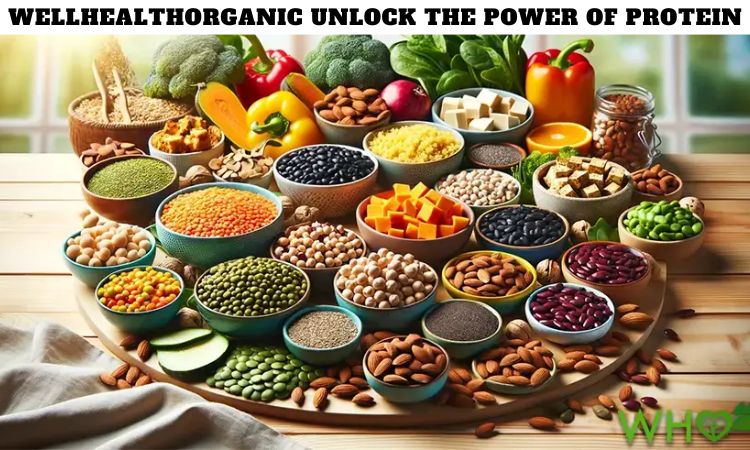
Protein is the cornerstone of health. At Wellhealthorganic, we emphasize nature-driven nutrition that supports a stronger, healthier body. In this in-depth guide, we unlock the power of protein, diving into its science, benefits, sources, and how it influences everything from muscle gain to metabolic function. Whether you are an athlete, a busy professional, or simply someone who values wellness, protein is the nutrient that fuels your foundation.
What Is Protein and Why Does It Matter?
Protein is a macronutrient made up of amino acids — the building blocks of life. Every cell, tissue, and enzyme in the body requires protein for repair and regeneration. It’s responsible for:
-
Building muscles and tissues
-
Producing enzymes and hormones
-
Boosting immunity
-
Transporting oxygen
-
Maintaining healthy skin, hair, and nails
The Wellhealthorganic unlock the power of protein philosophy rests on the belief that optimal protein intake equals optimal performance, recovery, and vitality.
Types of Protein: Plant-Based vs Animal-Based
Understanding the difference between plant-based and animal-based protein helps you make informed nutritional choices.
Animal-Based Proteins
-
Complete proteins with all 9 essential amino acids.
-
Found in chicken, eggs, dairy, fish, beef.
-
Ideal for muscle synthesis but may come with added saturated fats.
Plant-Based Proteins
-
Found in lentils, quinoa, tofu, chia seeds, spirulina, hemp seeds.
-
Rich in fiber and antioxidants.
-
Often combined to make a complete protein profile (e.g., rice + beans).
At Wellhealthorganic, we promote a balanced intake combining the benefits of both — especially with organic plant-based sources that are eco-conscious and heart-healthy.
How Much Protein Do You Need?
Your daily protein needs depend on age, gender, weight, and activity level. Here’s a general guide:
| Category | Daily Protein Intake (g/kg body weight) |
|---|---|
| Sedentary Adult | 0.8g |
| Active Individual | 1.2g – 2.0g |
| Athlete or Bodybuilder | 1.6g – 2.4g |
| Pregnant Women |
+25g per day |
We at Wellhealthorganic recommend evaluating your individual goals — whether it’s muscle gain, weight loss, or overall wellness — and customizing your protein intake accordingly.
Top 10 Organic Protein-Rich Foods
Here’s our curated list of the most effective and clean organic protein sources that align with the Wellhealthorganic unlock the power of protein approach:
-
Quinoa – 8g protein per cup; complete protein source
-
Chia Seeds – 5g per 2 tablespoons; fiber-rich
-
Spirulina – 4g per tablespoon; antioxidant-dense
-
Hemp Seeds – 10g per 3 tablespoons; omega-3 rich
-
Lentils – 18g per cup; iron and fiber loaded
-
Tempeh – 21g per 100g; gut-friendly fermented soy
-
Pumpkin Seeds – 7g per ounce; high in zinc
-
Greek Yogurt (Organic) – 10g per 100g; probiotic-rich
-
Organic Eggs – 6g per egg; bioavailable amino acids
-
Almond Butter – 7g per 2 tablespoons; good fats included
Choosing organic sources ensures reduced exposure to hormones, pesticides, and GMOs — aligning with our Wellhealthorganic values of clean and conscious eating.
The Role of Protein in Muscle Building and Fat Loss
Protein isn’t just for bodybuilders. Whether you want a leaner frame or better metabolic health, protein helps by:
-
Preserving muscle mass during fat loss
-
Increasing satiety and reducing hunger
-
Boosting metabolic rate (TEF – Thermic Effect of Food)
-
Reducing cravings and late-night snacking
This is why the Wellhealthorganic unlock the power of protein plan emphasizes protein in every meal, especially post-workout for muscle repair and energy restoration.
Common Signs of Protein Deficiency
Lack of adequate protein may lead to:
-
Weakness and fatigue
-
Brittle nails and hair fall
-
Poor concentration
-
Frequent illness due to low immunity
-
Delayed wound healing
-
Muscle loss and joint pain
A simple fix: Incorporate more organic protein into your meals. Smoothies with plant-based protein powders, lentil soups, and quinoa salads are excellent ways to maintain balance.
Timing & Distribution of Protein Intake
Instead of eating all your protein in one meal, spread it out across the day. Here’s how a day might look following the Wellhealthorganic unlock the power of protein plan:
-
Breakfast: Chia pudding with almond milk and hemp seeds
-
Lunch: Quinoa bowl with chickpeas, kale, and tahini
-
Snack: Greek yogurt with spirulina powder
-
Dinner: Lentil stew with sautéed vegetables and brown rice
-
Post-workout: Organic plant-based protein shake
This distribution enhances muscle protein synthesis and ensures steady energy.
Wellhealthorganic Protein Supplements: A Cleaner Alternative
We advocate whole foods first, but understand the need for supplementation. That’s why Wellhealthorganic protein powders:
-
Are 100% organic and plant-based
-
Contain no artificial sweeteners or additives
-
Are rich in BCAAs and digestive enzymes
-
Available in flavors like vanilla chai, cacao coconut, and matcha green
These blends are ideal for those with tight schedules, gym goals, or digestive sensitivities.
Who Should Prioritize Protein the Most?
While everyone needs protein, certain groups need to be especially mindful:
-
Athletes and gym-goers: For muscle repair and stamina
-
Vegans/Vegetarians: To avoid amino acid deficiencies
-
Older adults: To counter muscle wasting (sarcopenia)
-
Women during pregnancy: For fetal development
-
Children and teenagers: For growth and development
The Wellhealthorganic unlock the power of protein guide can help tailor plans for each demographic with personalized nutrition.
Final Thoughts: Protein Is Not a Trend — It’s a Lifeline
Embracing protein-rich, organic foods isn’t a diet trend — it’s a lifestyle shift. At Wellhealthorganic, we believe that by unlocking the full potential of protein, you can achieve optimal health, sustained energy, and holistic well-being.


